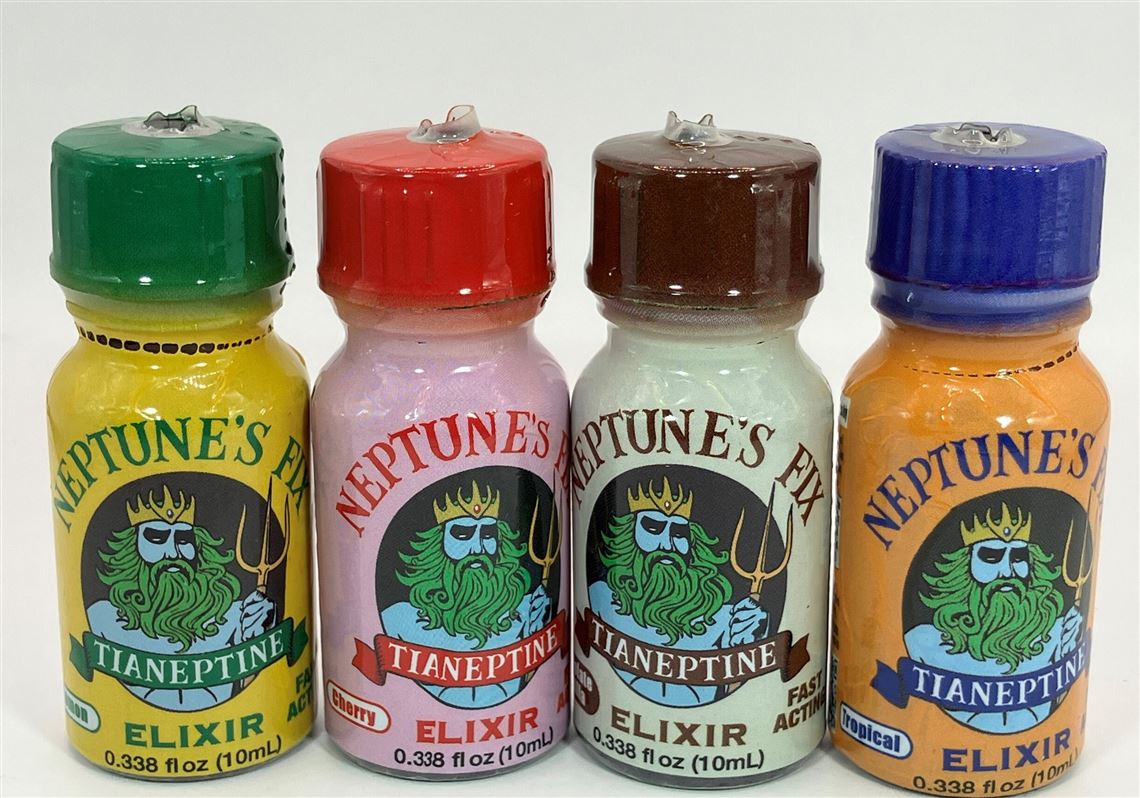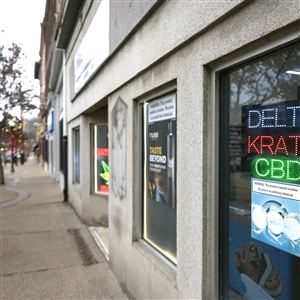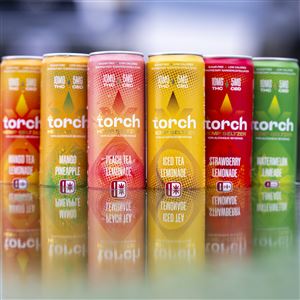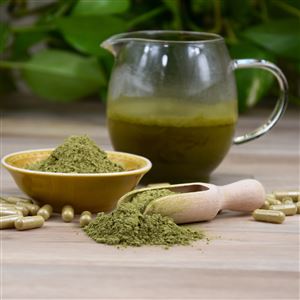This is the fourth installment in our Sort of Sober series, in which we look at legal mind- and body-altering substances.
Known as “gas station heroin” and marketed as a mood-enhancing herbal supplement, tianeptine is quietly finding its way into the hands of consumers, many of whom are unaware of its addictive properties and overdose dangers, substance abuse experts say.
Brands such as Neptune’s Fix, Za Za and Tianaa exist in a murky legal limbo and are sold at mom-and-pop gas stations and online in the U.S. as nootropics, mood enhancers that often promise to improve cognitive function.
Approved for use as an antidepressant in some European, Asian and South Americas countries, tianeptine is not approved by the Food and Drug Administration for any medical use in the U.S. The FDA in late 2023 issued a public safety alert warning consumers and sellers of tianeptine’s risks.
Despite that, some companies are marketing and selling tianeptine products to consumers with claims that the substance can improve brain function and treat anxiety, depression, pain, opioid use disorder and other conditions, per the FDA.
Gas station heroin is a pretty accurate nickname, said James Mahoney, the director of neuromodulation for addiction research in the behavioral medicine and psychiatry department at the WVU Rockefeller Neuroscience Institute.
“Whenever you hear the word ‘heroin,’ you think about the lethal consequences, and this certainly can have them,” Mahoney said. “I think it is an accurate depiction and description of what this substance can do.”
In the U.S., reports of severe side effects involving tianeptine are increasing, according to the FDA. Poison control center cases connected to tianeptine exposure have increased nationwide, from 11 total cases between 2000 and 2013 to 151 cases in 2020 alone.
In a 2018 report, the Centers for Disease Control and Prevention suggested tianeptine was a “possible emerging public health risk.” The CDC noted that most tianeptine exposures occurred among ages 21 to 40 with neurologic, cardiovascular and gastrointestinal symptoms being the most commonly reported health impacts, with some effects mimicking opioid toxicity.
Many users also reported experiencing opioid-like withdrawal symptoms when they attempted to cut back or stop using the substance. Often, users were found to have used the substance in combination with other drugs, including, per the CDC, ethanol, benzodiazepines, opioids and phenibut, an unregulated psychoactive drug developed in Russia in the 1960s as an anti-anxiety medication.
“I think this has been something that's been on our radar for years, and it's only been recently that we've seen the uptick in cases,” said Joshua Shulman, the medical director of the Pittsburgh Poison Center.
“It's part of the troubling trend of these substances, ‘dietary supplements,’ and their legal status is gray. They're not illegal, but they're not approved substances,” said Shulman, who is also an assistant professor of medical toxicology at Pitt’s School of Medicine and an assistant professor in pharmacy at Pitt’s School of Pharmacy.
The ease of acquiring tianeptine makes it dangerously appealing, Mahoney said. “You order it online, it just gets delivered to your door. So, it just makes it even easier to get access to it and I really don't think that the public completely understands the adverse consequences.”
When evaluating tianeptine for use in the U.S., experts discovered that, along with its serotonergic properties, tianeptine also acts as a full agonist at the mu opioid receptor — a protein in the brain and body that binds to opioids, which can cause pain relief and feelings of euphoria. This significantly increases the risks of addiction and withdrawal, according to a study published last year by the National Institutes of Health.
Tianeptine’s interaction with this receptor is “really kind of what started to create the buzz around the potential adverse consequences when it comes to addictive properties and overdose because it acts very similar to opioids,” Mahoney said.
That it’s often used in conjunction with other drugs and unknown synthetic substances adds another layer of difficulty for treatment.
“You’ll find it in combination with methamphetamine … cocaine, benzos. And all these synthetics that are coming out now that make it just very, very difficult to treat and get ahead of,” Mahoney said.
Short-term effects of using tianeptine include quickly developing a tolerance to its effects, which naturally encourages users to increase their intake, often to dangerously high levels, Mahoney said.
“When that happens, you up the increase for potential withdrawal effects very similar to other opioids. You get the agitation, confusion, physiological symptoms,” with the most dangerous side effect of respiratory depression, the number one symptom of opioid overdoses, Mahoney said. Studies indicate that tianeptine may have fewer cardiovascular effects than other opioids, but if a user is mixing it with “methamphetamine or cocaine, then the damage is already done there from those substances,” he said.
According to the Drug Enforcement Administration, severe adverse health effects, including respiratory depression, severe sedation and death, have occurred from the misuse of tianeptine.
Legislative efforts
In January 2024, U.S. Reps. Jimmy Panetta of California and August Pfluger of Texas introduced bipartisan legislation aimed at placing some control over tianeptine. A few days later it was referred to a subcommittee, where it remains.
Meanwhile, in Pennsylvania, Rep. Andrew Kuzma, R-Elizabeth Township, introduced House Bill 977 in April 2023 in response to concern from a constituent whose relative was addicted to “a sketchy dietary supplement.” That substance was tianeptine.
“Tianeptine is a very dangerous antidepressant that has never been approved by the U.S. Food and Drug Administration and has been associated with numerous overdose deaths,” Kuzma said in a 2023 news release. “Businesses have gone around safety guidelines and been able to sell it in the U.S. by labeling it not for human consumption or adding it to dietary supplements. Tianeptine creates a euphoria that mimics heroin and other opioids and is highly addictive. We need to take steps now to prevent deaths and addiction from this hazardous product.” Kuzma did not respond to several interview requests for this article.
The state judiciary committee approved the bill with a 20-5 vote and sent it to the full House for consideration. Five Democrats cast votes in opposition with some arguing that criminalizing substance abuse is not a solution.
Easy to buy, use
The ease of purchasing tianeptine is one of the big reasons it’s gaining in popularity, said Jennifer Herbert, director of outpatient services at the Monroeville location of Recovery Centers of America.
“You can get some of these at the gas station, drugstore, black market. You don't have to search out a drug dealer,” Herbert said. “But I also think it's how they're marketed. A lot of them are marketed as mood enhancers for mental clarity, to fight anxiety and depression. So I think a lot of people who don't really know, look at it as part of self-care,” which is so misleading.
“I think a lot of things [people are] using are not necessarily things that provide self care and emotional stability.”
When discussing these substances with patients, “I look at how it impacts people's ability to deal with their diagnoses, whether it's addiction, depression, anxiety, PTSD. Many of these substances are counterproductive to what we are trying to do in the therapeutic process,” Herbert said.
For example, she said, if a patient who is seeking treatment for PTSD were to take tianeptine for its anti-anxiety properties, they’re just numbing their symptoms rather than working through them. When confronted with a threat, most people experience a typical fight-or-flight response. However, someone with PTSD may perceive danger everywhere, even in situations where no immediate threat exists.
In treating PTSD, therapists address the patient’s anxiety and trauma issues that are making them feel like they’re in danger, that the world is unsafe and that they always need to be on guard against threats, Herbert explained.
“But in order to really work through PTSD, you have to … turn on the frontal lobe, your logic and reasoning. So the abuse or use of these drugs not only shut down the amygdala, but they shut down our ability to get to our frontal lobe,” she said. “It's kind of scary because it makes clients feel better immediately. And of course, they want to continue because they feel the relief, but it doesn't allow them to” work through their trauma and find real healing.
“So for the moment, you'll feel better, but in the long term, you're still going to have all those underlying issues.”
First Published: February 16, 2025, 10:30 a.m.
Updated: February 17, 2025, 5:13 p.m.













 T
T







